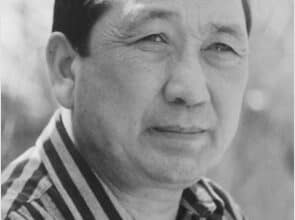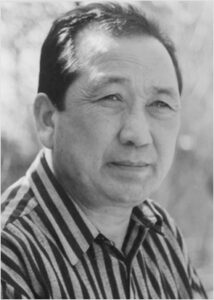
Writer and journalist Memtimin Hoshur was born in at Ghulja City in 1944. He studied at Murad School in Ghulaj City from 1951 to 1956 and at Ghulja City 3rd Middle School from 1956 to 1962. In 1962, Memtimin admitted the Faculty of Languages and Literature of Xinjiang University. After graduating in 1967, he worked in government administrative agencies for a while. During the cultural revolution he got persecuted and underwent “re-education”, returned to work at the end of 1979. He had been in charge of the Ili River, a literature magazine since 1979, and he was the vice president of the Writers’ Association of Ili Kazak Autonomous Prefecture. In 2000s, he was elected as the vice-chairman of the Xinjiang Uygur Autonomous Region Literature and Artists Association and the chairman of the Autonomous Region Writers’ Association.
Mamtimin Hushur was really successful with his first fiction “Apple”, it got published in 1965 which made his name popular among the Uyghur readers. Since then, especially since the end of the 70s, he has entered the field of prose with a new sarcastic narrations.
In 1980s, Memtimin Hoshur started to get attention with his black humors. A number of fictions such as Passengers in the Shell”, “Ayxan (ئايخان)” (in Kazakh) – Aikhan, Crazy, The Mustache Dispute, Edged Cup, and Golden Tooth Dog, Festival for the Pigs.
Memtimin Hoshur wrote some biographic novels such as “Nuzugum (نۇزۇگۇم)” (in Mongolian) – “Nuzugum”, “Friends”, “Hello, Brother Hesam“, “The Years Passed by“. His novel Blessed Snow, which received strong attentions and good reviews in the literary field and among booklovers.
Memtimin Hoshur had also published academic books such as “A Brief History of Ili Uyghur Drama”, “Strange Life, Strange Logic”. And he also published some non-fiction assays like “Our fiction in this year”, and “It’s Not Easy to Be a Scholar”. Memtimin Hoshur translated some novels into Uyghur, such as “Ih, 15-year-old Khalida”.
Mamtimin Hoshur’s published works are:
- “Ney Awazi – 笛声 – (نەي ئاۋازى)” – “The sound of the Flute” (1982, Xinjiang People’s Publishing House – 新疆人民出版社)
- “Ot Ketken Derya – 燃烧的河流 – (ئوت كەتكەن دەريا)” – “The Burning River” (2001, Xinjiang People’s Publishing House – 新疆人民出版社)
- “Kona – yéngi Ishlar – 新旧轶事 – (كونا – يېڭى ئىشلار)” – “Old Things are new” (1986, National Publishing House – 民族出版社(北京))
- “Salam, Hésam Aka (سالام، ھېسام ئاكا)” – “Hello, Brother Hesam” (1990, Xinjiang Youth Publishing House – 新疆青少年出版社)
- “Ölükke Xet (ئۆلۈككە خەت)” – “Letter to the Dead” (1993, Kashgar Uyghur Publishing House – 喀什噶尔维吾尔出版社)
- “Qum Basqan Sheher – 被沙漠淹没了的古城 – (قۇم باسقان شەھەر)” – “The City buried under the desert” (1996, Xinjiang Youth Publishing House – 新疆青少年出版社)
- “Tolun Ay – 十五的月亮 – (تولۇن ئاي)” – “Full Moon” (2009, Xinjiang Youth Publishing House – 新疆青少年出版社)
- “Gülligen Dala – 野花盛开的原野 – (گۈللىگەن دالا)” – “Blossomed Wild” (2010, Xinjiang Youth Publishing House – 新疆青少年出版社)
- “On Ikki Muqamning Ili Wariyanti (ئون ئىككى مۇقامنىڭ ئىلى ۋارىيانتى)” – “Ili variant of Twelve Muqams” – (Xinjiang People’s Publishing House – 新疆人民出版社)
- “Bu Chüsh Emes (بۇ چۈش ئەمەس)” – “This is not a dream” – (Xinjiang People’s Publishing House – 新疆人民出版社)
- “Nuzugum (نۇزۇگۇم)” (in Mongolian) – (Xinjiang People’s Publishing House – 新疆人民出版社)
- “Yillar Shundaq Ötken – 岁月是那样过去的 – (يىللار شۇنداق ئۆتكەن)” – “The Years Passed by” (1988, Xinjiang People’s Publishing House – 新疆人民出版社)
Memtimin Hoshur was a candidate senior editor, a member of the Chinese Writers Association, and a member of the Chinese Minority Writers Academic Association.
Memtimin Hoshur got detained in the camp in 2018, released in 2019. His current situation is unknown.
Some of his books on the internet:
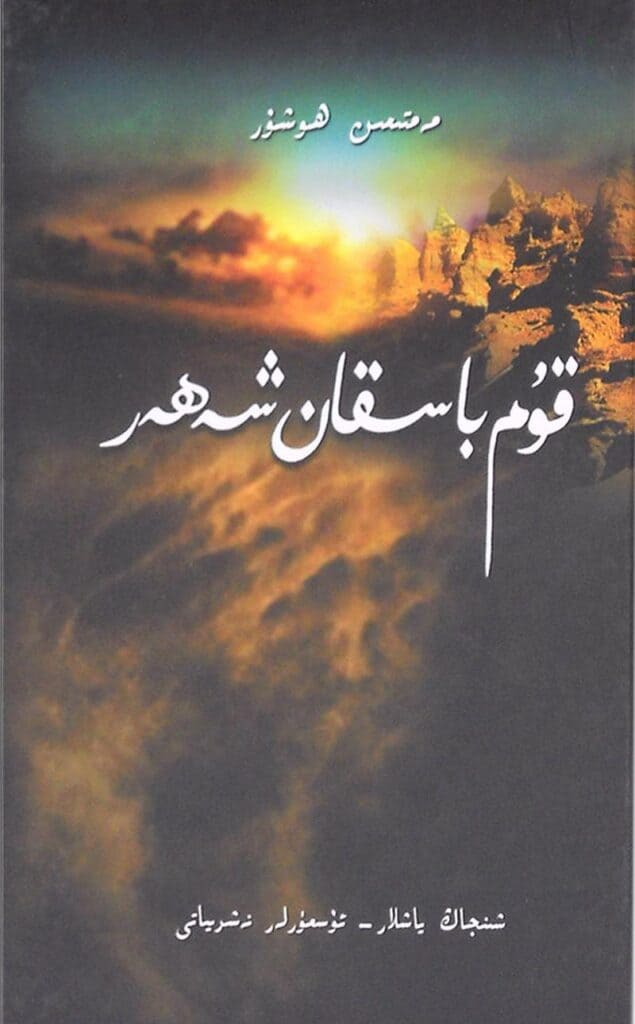
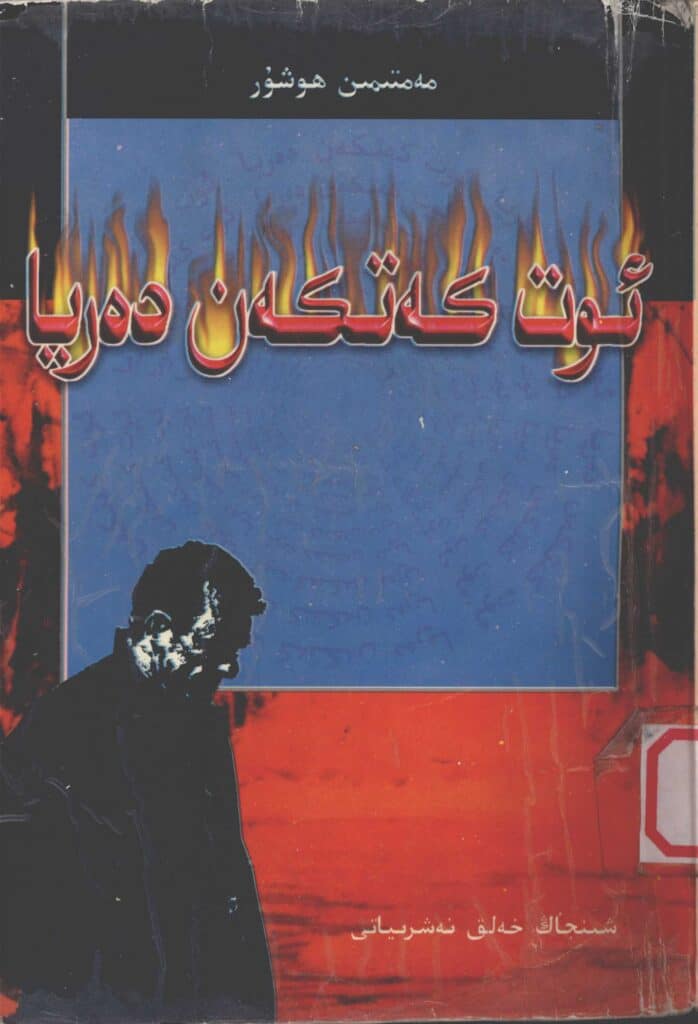
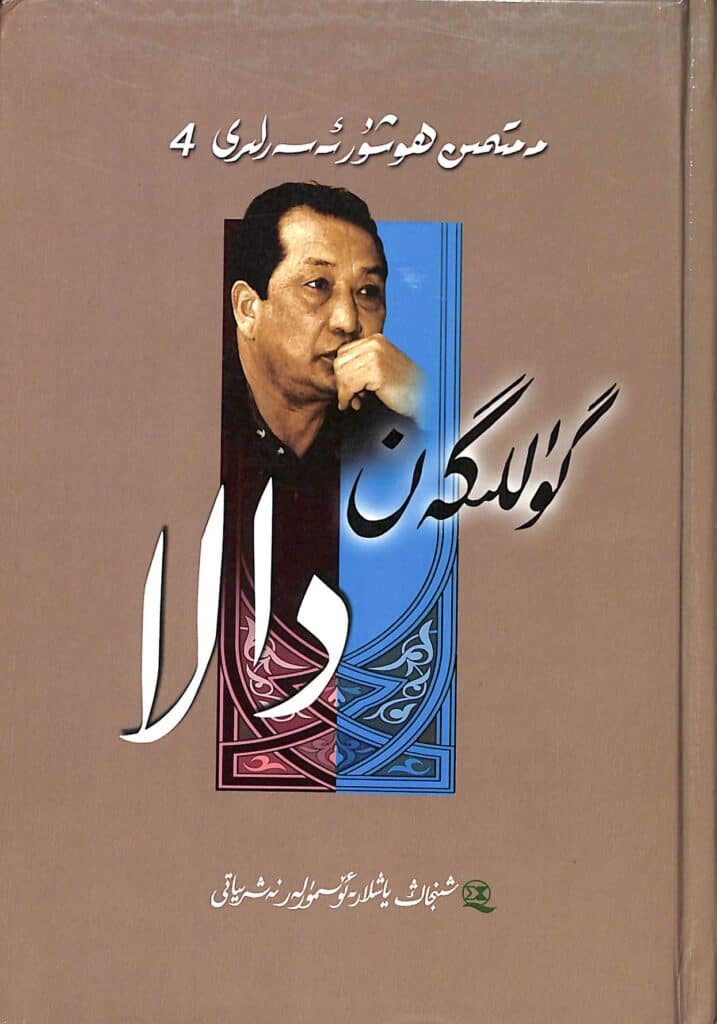
Some of his works found on internet:A Letter from Afar (يىراقتىن يېزىلغان خەت)
| Rizwan,
Two weeks ago the two of us were living together. Now, I am writing you this letter from a faraway place. Before departing, I left you a note. Were you, perhaps, surprised to find it sitting on the table when you came home from work that evening? In it I simply said: I am travelling today, don’t worry, I will write again about my return. I only said this so you wouldn’t be alarmed. In my heart of hearts, I’d already decided not to come back. I made it through that night on the long benches of the city parks. As dawn broke, I wandered about on the many footpaths among the trees, pondering what to do. Soon, the morning sun rose and poured its many-coloured rays onto the leaves. The flowers in their beds swam in the blushing light. I drank the pure morning air. How beautiful life is! Yet I still wished to die. Do not be surprised. Not all those who want to kill themselves are weary of life. Among them are those who love life, but who must carry out the death sentence ordained by their own conscience… The two of us had passed by those flowers many times. There, the white and yellow roses you love were blooming joyously as before. The bench under the trees, the one we always sat on––I warmed it with my lone body that night. This was my final farewell to the places I wished to hold in my memory. The next day I hailed a car and arrived at village A. I went because a close classmate of mine lived there. I had planned to unburden my heart to this brother of mine, then throw myself into the tumultuous river that flowed at the bottom of the village. I stopped when I drew near my classmate’s home. I had not visited those parts in more than seven years. The young saplings we had planted along the stream back then had grown tall and large. From within his courtyard I could hear the sounds of children playing and a woman calling for them to eat. At that moment, I felt that I could not enter the house. What was the point of pouring out my grief and unsettling these people who were busy with their own lives, their own children? I thought to myself: let the unsettling grief die with me, rather than bother the living. And so I left. I walked out of the village, down the hills covered with brush, and reached the edge of the river. It streamed and rumbled, twisting under a tall cliff. I sat on a large rock, smoking a cigarette. Desert birds flew overhead, stretching their wings across the unbounded blue sky. Somewhere below, a shepherd boy’s flute began to play. The entire green valley seemed to breathe lightly to the plaintive melody of that flute. I suddenly thought with regret: the nature, the birds, the rapid waters—they all live with such vigour and beauty. But I wanted to die… Rizwan, I did not die that day. I took a few drags on the cigarette in my hand and sprang to my feet. Only a few steps from death, I backed away from the edge of that frightful precipice. Yesterday I arrived in city X. Perhaps, by the time this letter reaches your hands, I will be even farther away. To explain why I left you so suddenly, I must start at the beginning. The first time we met, you asked me, “Have you ever been in love?” and I responded with an offhand “No.” “I loved someone once, but he was an innocent man who was killed at the hands of evil men during the Cultural Revolution. I will never forget him for the rest of my life,” you said, and lowered your gaze. I glanced at you. Your cheeks had reddened with emotion. From the flame lit in your heart by this man who was a stranger to me… Rizwan, do you remember the first time you picked a rose for me? Was that flower a symbol of love? No! We were just two people brought together by life’s circumstances. Love is such a fragile emotion; it never repeats. You can try to force yourself to love again, but your love will be less sincere. And you had already given your love to that man… Before we were married, we stood on a hill covered with lush grass and, as you looked into the distance, you told me again you would never forget that man you kept in your heart. You asked for my permission to talk about him, to keep the journals in which you had written about him, and that I respect your love for him. I accepted your terms. I never told you, but I too had loved someone. In fact, she is still alive. When she left me, I suffered. I could not forget her eyes, the way they had once looked at me with love, nor her warm arms that once embraced my neck. So I understood your feelings. And since your man had passed on, there was no need for me to be jealous or begrudge you your love. However, Rizwan, during those years I spent with you, I came to realise how deeply this man had seeped into your life. You spoke of him multiple times a day. At any given moment you might sink into your sweet memories of him. In those moments you would become lost in the past; in those moments you would sit in your boat of dreams with the man you loved… Why did fate bring us together in one house, instead of placing you with your man, and me with my woman? Was this a cruel twist of fate; was fate mocking us? What does one even call a relationship like ours? We respected each other, loved each other, never once had an argument in all those years together, isn’t that right? If what we had wasn’t love, then what was it? You would answer by saying we were a harmonious couple. And you spoke the truth. We were a harmonious couple. The two ghosts we had given our love to continued living with us in our hearts. Rizwan, you are a kind and gentle woman. That is why the two of us were able to live together. You speak honestly and there is no malice in your heart; I respected the feelings you had for that man and I admired your loyalty to his love… The girl I loved was unable to have that faith in me. I met her before the chaos of the Cultural Revolution began. The magical moonlit nights, the clear and rippling waters, a pair of hearts that beat elatedly, a love song that tore through the flesh of the darkest nights; scenes like these adorned my life then. When the years of chaos came upon us, my mind was set aflame. I ran headfirst into the melee and heavy rain of bullet fire without knowing a thing about what I was doing. The scoundrels who used people like us in their cruel monkey games gave us the beautiful name of Yéngi Shey’i––The New Wave. We, the Yéngi Shey’i of the time, prided ourselves in causing society’s destruction; cries of the innocent filled us with ecstasy. I went berserk; no sage words could get through to me. The slogans and propaganda of the time were poured into my mind like lead, and I truly believed the path I followed was the only true one. However, I had one weakness. Despite being resolute and stubborn on certain matters, I was gentle and yielding before the woman I loved. I was ready to do anything she said. Thinking of it now, I see that she was the only one who could have saved me from the quicksand I was sinking into. However, she broke off our relationship and left me without a single word. At the time I could not understand why she would leave a Yéngi Shey’i like me. I laughed at her foolishness. Only after years passed and the reality of the events came to light, I realised she had been right to do so. Rizwan! How would you describe a human life? To me, it is a blank book that each person writes their history in; once that person dies, the record of that life also ends. Many pages of my life have been filled with such cursed history. By the time I realised how foolish I had been in those ten years, my lover had already built a life with someone else. I deeply regretted my actions. I thought to myself that I should fill the rest of my life’s pages with good deeds and intentions. And so it was when we met. Rizwan, I respect you so much because of that as well; because you and those youths like you remained untarnished through those dark years. I cannot forget the 23rd of last month. That day you looked right at me and said: “Nuri, I wrote a letter to Ayup’s mother and had her send me a picture of him. I gave it to some people who can enlarge it and it will be ready today. Will you let me bring it home and display it?” I laughed and said, “Why even ask? Bring it!” That afternoon I came home and saw a large picture hanging on the wall. It showed a handsome, dark-browed fellow. My heart skipped a beat. Was the large dark spot on the left side of his forehead a mole or a lock of hair? I moved closer to the picture and examined it carefully. The dark patch on the left side of his forehead was indeed a mole. I felt dizzy and sat down… I remember that night in 1968 like it was yesterday. It had happened in an underground prison run by the Jin-Sheytanlarni Yoqitish Jenggiwar Etriti, The Militant Group to Eradicate Devils. I was interrogating a university student in his mid-twenties and had been given the task of making this “devil” obey our commands and sign materials corroborating the existence of a counter-revolutionary organisation. He had already been interrogated for three nights by others who hadn’t been able to get a word out of him. I exhausted myself beating him with a leather belt. At last, he couldn’t take it anymore and kicked me, sending me flying backwards. This act of defiance tried my patience; I hit him hard on the head with a metal pole, and he reeled sideways and fell. The thick blood that trickled from his mouth began pooling on the cement floor. The metal that had struck the back of his head had also cut through the black cloth tied around his face, and the young man’s contemptuous eyes were fixed directly on me. He recognized me. I believed he would take vengeance on me if he survived, so I shot him dead. It was then that the dark mole on the left side of his forehead ingrained itself in my memory. Rizwan! I could not look you in the eye that day. That night you looked at the picture on the wall and slept peacefully. Perhaps you revisited your memories with that young man in your dreams. But I couldn’t sleep, and from that day on I suffered at the thought of facing you again. Aside from the two of us, that young man in the photo also lived in our house, did he not? You looked at me as “a good partner in life.” But was I not the unscrupulous man who had destroyed the beautiful flowers decorating your world? What abhorrence would fill your eyes when you discovered that I was the murderer who killed your lover? It was with these thoughts in my mind that I decided I needed to leave. You may read this letter and loath the murderer you unwittingly lived with. You may ask, “Why didn’t you just throw yourself into the river?” It was not because I was afraid of dying. It was because I liked living. But I will die anyway. Before that, however, when the chief culprits who incited us to persecute one another are put on trial, I will say what needs to be said. And then I will die. I will stand before the law and confess my crimes, ask for a death sentence, and that is how I will die. When they give me the death sentence, I want you to be the one to shoot me, no one else. The moment you put a bullet in my head with your own hands, the moment you console yourself by saying “I have avenged the person I love,” I too will be free of my tortured conscience and close my eyes in peace. Wishing you a blessed life, Nuri 1979 |
رىزۋان: ئىككى ھەپتە ئىلگىرى ئىككىمىز بىر ئۆيدە ئىدۇق. ھازىر بۇ خەتنى سىزگە يېراقتىن يېزىۋاتىمەن. ئۆيدىن كېتىش ئالدىدا خەت قالدۇرۇپ كەتكەنىدىم. شۇ كۈنى چۈشتىن كېيىن سىز ئىشتىن قايتىپ كېلىپ، جوزا ئۈستىدىكى خەتنى كۆرۈپ ھەيران بولغانسىز؟ مەن ئۇ خەتكە ئاددىيلا قىلىپ: بۈگۈن سىرتقا ماڭىمەن، ئەنسىرىمەڭ، قايسى ۋاقىتتا قايتىپ كېلىدىغانلىقىم توغرىسىدا ئايرىم خەت ئەۋەتىمەن، دەپ يازغانىدىم. بۇ سىزنى ئالاقزادىلىككە سېلىپ قويماسلىق ئۈچۈنلا دېيىلگەن گەپ ئىدى. كۆڭلۈمدە بولسا، بۇ ئۆيگە قايتىپ كەلمەيمەن، دېگەن قارارغا كېلىپ بولغانىدىم. شۇ كۈنى كېچىدە شەھەرلىك باغچىنىڭ ئۇزۇن ئورۇندۇقىدا يېتىپ تاڭ ئاتقۇزدۇم. سەھەرلىكى باغچىنىڭ دەرەخلىرى ئارسىدىن كەتكەن ئاياغ يوللىرىدا ئۇياق-بۇياققا مېڭىپ، نېمە قىلىشىم توغرىسىدا قايتا ئويلاندىم … ئازدىن كېيىن، ئەتىگەنلىك قۇياش كۆتۈرۈلۈپ، يۇپۇرماقلار ئارىسىدىن ئۆزىنىڭ رەڭمۇ رەڭ شولىلىرىنى تۆكتى. گۈللۈكلەردىكى گۈللەر قىزغۇچ نۇرغا چۆمۈلدى. مەن ئەتىگەنلىك ساپ ھاۋادىن قېنىپ نەپەس ئالدىم. ھايات نېمىدېگەن گۈزەل! لېكىن، مەن ئۆلۈشنى خالايمەن. سىز ھەيران بولماڭ. ئۆزىنى ئۆزى ئۆلتۈرگۈچىلەرنىڭ ھەممىسى ھاياتتىن بىزار بولغان بولمايدۇ. ئۇلارنىڭ ئىچىدە ھاياتنى سۆيىدىغان، ئەمما ۋىجداننىڭ ئۆلۈم جازاسىنى ئۆزى ئىجرا قىلىدىغانلارمۇ بار … ئىككىمىز ئاشۇ گۈللۈكلەر ئارىسىدىن كۆپ قېتىم ئۆتكەنىدۇق. ئەنە، سىز ياخشى كۆرىدىغان ئاق، سېرىق ئەترە گۈللەر يەنە ئىلگىرىكىدەكلا كۈلۈپ ئېچىلىپ تۇرۇپتۇ. بىز ھەر دائىم كېلىپ ئولتۇرىدىغان دەرەخلەر ئارىسىدىكى ھېلىقى يۆلەنچۈكلۈك ئورۇندۇقنى مەن بۈگۈن كېچە ئۆز بەدىنىم بىلەن ئىسسىتتىم. بۇ مېنىڭ خاتىرىلىك جايلار بىلەن ئەڭ ئاخىرقى قېتىم خوشلىشىشىم ئىدى. ئەتىسى مەن ماشىنىغا ئولتۇرۇپ، <<ئا>> يېزىسىغا يېتىپ كەلدىم. بۇ يەردە توختىشىمدىكى سەۋەپ، بۇ يەردە مېنىڭ يېقىن بىر ساۋاقدىشىم تۇرىدۇ. كۆڭلۈمدىكى بارلىق گەپلەرنى شۇ بۇرادىرىمگە ئېيتىپ، ئاندىن ئاشۇ يېزىنىڭ تۆۋەن تەرىپىدە شاۋقۇن سېلىپ ئېقىۋاتقان دەرياغا ئۆزۈمنى تاشلىماقچى ئىدىم. ساۋاقدىشىمنىڭ ئۆيى ئالدىغا كەلگەندە توختىدىم. مېنىڭ بۇ يەرلەرگە كەلمىگىنىمگە يەتتە-سەككىز يىلدىن ئاشقانىدى. ئۆز ۋاقتىدا ئېرىق بويلىرىغا يېڭىدىن تىكىلگەن كۆچەتلەر ھازىر ئېگىز بوي تارتىپ، يوغىناپ كېتىپتۇ، ھويلىدىن بالىلارنىڭ ۋاراڭ-چۇرۇڭى بىلەن بىر ئايالنىڭ بالىلارنى تاماققا چاقىرغان ئاۋازى ئاڭلاندى. شۇ چاغدا، مېنىڭ بۇ ئۆيگە كىرىشكە كۆڭلۈم تارتمىدى. ئۆز تۇرمۇشى، ئۆز بالىلىرى بىلەن ئاۋارە بولۇۋاتقان بۇ كىشىلەرگە ھەسرەت تۆكۈپ، ئۇلارنىڭ كۆڭلىنىڭ ئارامىنى بۇزۇشنىڭ نېمە ھاجىتى؟! ئىچىمدە: ياشاپ قالىدىغان كىشىلەرنىڭ ئارامىنى بۇزۇدىغان ھەسرەتمۇ مەن بىلەن بىللە كەتسۇن، دېدىم-دە، كېتىپ قالدىم. يېزىدىن چىقىپ، شىۋاقلار بىلەن قاپلانغان دۆڭلۈكتىن تۆۋەنلەپ چۈشۈپ، دەريا بويىغا يېتىپ كەلدىم. ئېگىز يار ئاستىدا لايقىپ ئېقىۋاتقان دەريا ھەيۋەتلىك شارقىرايتتى. مەن يوغان قورام تاش ئۆستىگە كېلىپ ئولتۇرۇپ، تاماكا چەكتىم. پايانسىز كۆك ئاسماندا چۆل قۇشلىرى قاناتلىرىنى كېرىپ ئۇچماقتا ئىدى. تۆۋەندە بىر يەردىن پادىچى بالىنىڭ نەي ئاۋازى ئاڭلىنىشقا باشلىدى. بۈتۈن ۋادا گويا ئاشۇ مۇڭلۇق نەي ئاۋازى بىلەن بىللە يېنىك نەپەس ئېلىۋاتقاندەك ئىدى. مەن ئېچىنىش بىلەن ئويلىدىم: تەبىئەتمۇ، قۇشلارمۇ، دولقۇنلاپ ئېقىۋاتقان دەريامۇ – بۇلارنىڭ ھەممىسى قۇياش نۇرىدا تاۋلىنىپ، شۇنچە چىرايلىق ياشناپ تۇرۇپتۇ. لېكىن مەن ئۆلمەكچى… رىزۋان، مەن ئۆلمىدىم، قولۇمدىكى تاماكىنى ئىچىمگە قاتتىق-قاتتىق تارتىپ، ئورنۇمدىن چاچراپ تۇردۇم-دە، ھاياتىم بىلەن ئۆلۈمىم ئوتتۇرىسىدا پەقەت بىر-ئىككى چامداملا ئارىلىق قالغان بۇ دەھشەتلىك يار ئۈستىدىن كېتىپ قالدىم. تۈنۈگۈن مەن X شەھىرىگە كەلدىم. ئېھتىمال، بۇ خەت سىزنىڭ قولىڭىزغا تەگكەن چاغدا مەن تېخىمۇ يىراقلاپ كەتكەن بولارمەن. نىمە ئۈچۈن سىزدىن ئايرىلىشنى ئىستەپ قالغىنىمنى ئېيتسام، گەپنى يېراقتىن سۆزلەشكە توغرا كېلىدۇ. بىز دەسلەپكى تونۇشقان ۋاقتىمىزدا سىز مېنىڭدىن: – سىز ئىلگىرى بىرەرسىنى ياخشى كۆرۈپ باققانمۇ؟ – دەپ سورىغانىدىڭىز، مەن پەرۋاسىزلا: – ياق، – دەپ جاۋاپ بەردىم، سىز: – مەن ياخشى كۆرگەن، لېكىن ئۇ يىگىت <<مەدەنىيەت ئىنقىلابى>> دا يامان ئادەملەر تەرىپىدىن بىگۇناھ ئۆلتۈرۈۋىتىلدى، ئۇنى ئۆمرۈم بويى ئۇنتۇيالمايمەن، – دەپ يەرگە قارىدىڭىز. مەن سىزگە قارىدىم. سىزنىڭ مەڭسىلىرىڭىز ھاياجاندىن قىزارغانىدى. بۇ سىزنىڭ يۈرىكىڭىزدىكى ماڭا نامەلۇم يېگىت سالغان ئوتنىڭ تەپتى ئىدى … رىزۋان، سىزنىڭ ماڭا بىرىنچى قېتىم ئەتىر گۈل ئۈزۈپ بەرگەن ۋاقتىڭىز ئېسىڭىزدىمۇ؟ ئۇ گۈل مۇھەببەتنىڭ بەلگىسىمىدى؟ ياق! بىز پەقەت تۇرمۇش زۆرۈرىيىتى بىلەنلا ئۇچرىشىپ قالغان ئادەملەر. ھەقەقىي سۆيگۈ مۇھەببىتىنى باشتىن كەچۈرۈش ئىنسانغا پەقەت بىرلا قېتىم نېسىپ بولىدۇ. ئۇ شۇنچىلىك نازۇك ھېسسىياتكى، قايتا تەكرارلانمايدۇ. سىز باشقا بىرەرسىنى ياخشى كۆرۈشكە ئۆزىڭىزنى زورلاپ باقسىڭىزمۇ، ئۇ ئالدىنقىسىدەك چىن بولمايدۇ. سىزنىڭ مۇھەببىتىڭىز ئلىبۇرۇن ھېلىقى نامەلۇم يېگىتكە بېغىشلىنىپ بولغان… بىز توي قىلىشتىن ئىلگىرى، سىز يېشىل ئوتلار بىلەن قاپلانغان دۆڭلۈك ئۈستىدە يىراقلارغا قاراپ تۇرۇپ، ئۆزىڭىزنىڭ ئىلگىرى ياخشى كۆرگەن شۇ يىگىتىڭىزنى ئۇنتۇيالمايدىغانلىقىڭىزنى ئېتىپ، مېنىڭدىن: شۇ يىگىت توغرىسىدا گەپ-سۆزلەرنى قىلىشىڭىزغا، ئۇنىڭ تۇغرىسىدىكى خاتىرىلەرنى ساقلىشىڭىزغا رۇخسەت قىلىشىمنى، ئۇ يىگىتكە بولغان مۇھەببىتىڭىزنى ھۆرمەن قىلىشىمنى تەلەپ قىلدىڭىز. مەن ئۇ شەرتنى قوبۇل قىلدىم. چۈنكى، مېنىڭ ھاياتىمدىمۇشۇنىڭغا ئوخشاش بىر مۇھەببەت ۋەقەلىكى بار ئىدى، مەن ئۇنى سىزگە ئېتىشنى خالىمىدىم. ئۇ قىز ھازىرمۇ ھايات تۇرۇپتۇ. ئۇ مېنى تاشلاپ كەتكەندە مەن ئازابلاندىم. ئۇنىڭ ئۆز ۋاقتىدا ماڭا مۇھەببەت بىلەن قارىغان كۆزلىرىنى، بوينۇمغا گىرە سالغان ئىسسىق قوللىرىنى زادى ئۇنتۇيالمىدىم، شۇڭا، سىزنىڭ بۇ جەھەتتىكى ھېسسىياتلىرىڭىز ماڭا چۈشىنىشلىك ئىدى. ئىككىنچىدىن، سىزنىڭ ئۇ يىگىتىڭىز ئالەمدىن ئۆتكەن، مېنىڭ ئۇنىڭغا تارلىق قىلىشىمنىڭ، ئۇنىڭدىن سىزنى قىزغىنىشىمنىڭ ھېچبىر ھاجىتى يوق ئىدى. ئەمما رىزۋان، مەن سىز بىلەن بىللە بولغان شۇ يىللار ئىچىدە ئالەمدىن ئۆتكەن ئۇ نامەلۇم يىگىتنىڭ سىزنىڭ ھاياتىڭىزغا مەن پەرەز قىلغاندىنمۇ چوڭقۇر سىڭىپ كەتكەنلىكىنى ھېس قىلدىم. سىز ئۇنى ھەر كۈنى بىر نەچچە قېتىم تىلغا ئالاتتىڭىز. تۇرۇپلا تاتلىق خىياللارغا چۆكۈپ كېتەتتىڭىز. شۇنداق چاغلاردا سىز ئۆتمۈشنى ئويلايتتىڭىز، شۇنداق چاغلاردا سىز خىيال كېمىسىگە ئولتۇرۇپ ئۆزىڭىز ياخشى كۆرگەن يىگىت بىلەن ياشايتتىڭىز … نېمە ئۈچۈن تەقدىر سىزنى ئۆز يىگىتىڭىزگە، مېنى ئۆز قىزىمغا قوشماي، ئىككىمىزنى بىر ئۆيدە قىلىپ قويدى؟ بۇ تەقدىرنىڭ چاقچىقىمۇ ياكى مەسخىرىسىمۇ؟ بىزگە ئوخشاش كىشىلەر ئوتتۇرىسىدىكى مۇناسىۋەتنى نېمە دېيىش مۇمكىن؟ بىز بىر بىرىمىزنى ھۆرمەتلەيمىزغۇ، بىر بىرىمىزنى سۆيىمىزغۇ، شۇ يىللار ئىچىدە بىھ بىرمۇ قېتىم جاڭجاڭلاشمىدۇققۇ، بىزنىڭ ئوتتۇرىسىدىكى مۇناسىۋە مۇھەببەت بولمىسا، ئەمىسە نېمە؟! سىز بۇ سوئالغا <<بىز ئىناق ئەر-خوتۇن>> دەپ جاۋاب بېرەتتىڭىز. سىز راستىنى ئېيتتىڭىز. بىز ئەنە شۇنداق ئىناق ئەر-خوتۇن ئىدۇق. بىز مۇھەببىتىمىزنى بەرگەن ھېلىقى نامەلۇم كىشىلەر بىزنىڭ يۈرىكىمىزدە بىز بىلەن بىللە ياشايتتى. رىزۋان، سىز مۇلايىم، ئاق كۆڭۈل ئايالسىز. سىز بىلەن مەن شۇنىڭ ئۈچۈن بىر ئۆيدە تۇرالىدۇقكى، سىزنىڭ گېپىڭىز ئوچۇق، كۆڭلىڭىزدە يامانلىق يوق؛ مەن بولسام سىزنىڭ ھېلىقى يىگىتكە بولغان ھېسسىياتلىرىڭىزغا ھۆرمەت قىلدىم، سىزنىڭ مۇھەببەتتىكى ساداقەتلىكىڭىزنى قەدىرلىدىم … مەن سۆيگەن قىز مۇھەببەتكە ئۇنداق سادىق بولالمىغان. مەن ئۇ قىز بىلەن <<مەدەنىيەت ئىنقىلابى>> دىكى قالايمىقانچىلىقلار باشلىنىشتىن ئىلگىرى تونۇشقانىدىم. سېھىرلىڭ ئايدىڭ كېچە، شىرىلداپ ئېقىۋاتقان سۈزۈك سۇ، ھاياجاندىن دۈپۈلدىگەن بىر جۈپ يۈرەك، قاراڭغۇ تۈن قوينىنى يېرىپ ئۆتكەن مۇھەببەتلىك ناخشىغا ئوخشاش گۈزەل خاتىرىلەر شۇ چاغدىكى مېنىڭ ھاياتىمنى بېزىگەنىدى. قالايمىقانچىلىق يىللارغا يېتىپ كەلگەندە مېنىڭ مېڭەم قىزىپ كەتتى. نېمە قىلىپ، نېمە قويۇۋاتقانلىقىمنى بىلمىگەن ھالدا ۋاڭىلداپ ئېتىلىۋاتقان ئوق، ئۇرۇش-چېقىش قايناملىرىنىڭ ھەممىسىگە بېشىمچە كىرىپ كەتتىم. بىزدەكلەرنى مايمۇن ئويۇنىغا سېلىۋاتقان ئەبلەخلەر ئۇ چاغدا بىزگە <<يېڭى شەيئى>> دېگەن چىرايلىق ئۇنۋاننى بېرىشكەنىدى، بىز شۇ چاغدىكى <<يېڭى شەيئى>> لەر جەمئىيەتنى ۋەيرانچىلىققا سېلىۋەتكەنلىكىمىز بىلەن مەغرۇرغانلانىدۇق، بىگۇناھ كىشىلەرنىڭ دات پەريادلىرى بىزنى ھۇزۇرلاندۇرغانىدى. مەن شۇنچىلىك تەلۋىلەشكەن ئىدىمكى، ھېچكىمنىڭ نەسىھەت گېپى قۇلىقىمغا كىرمەيتتى. شۇ چاغدىكى شۇئار ۋە تەشۋىق گەپلەر كاللامغا قوغۇشۇندەك قۇيۇلغان بولۇپ، ئۆزۈمنىڭ ماڭغان يولىنى <<شەكسىز توغرا>> دەپلا بىلەتتىم. لېكىن، مېنىڭ بىر ئاجىزلىغىم بار ئىدى. باشقا ئىشتا قانچىلىك قاتتىا بولساممۇ، ھېلىقى ئۆزۈم ياخشى كۆرگەن قىز ئالدىدا شۇنچىلىك مۇلايىم، رايىش ئىدىم، ئۇ نېمە دېسە، مەن شۇنى قىلىشقا تەييار ئىدىم. ھازىر ئويلىسام، ئۇ چاغدا مېنى، مەن پېتىپ كېتىۋاتقان پاتقاقتىن قۇتقۇزۇپ قالىدىغانمۇ پەقەت شۇ قىزلا ئىدى. لېكىن، ئۇ ماڭا بىر ئېغىزمۇ گەپ قىلمىدى-دە، مەن بىلەن بولغان مۇناسىۋىتىنى ئۈزۈپ كېتىپ قالدى. ئۇ چاغدا ئۇنىڭ مەندەك بىر <<يېڭى شەيئى>> نى نېمە ئۈچۈن تاشلاپ كەتكەنلىكىنى چۈشىنەلمىدىم. ئۇنىڭ <<ئەقىلسىز>> لىقىغا كۈلدۈم. پەقەت يىللار ئۆتۈپ، ھەقىقەت ئايدىڭلاشقاندىلا، ئاندىن مەن ئۇ قىزنىڭ توغرا قىلغانلىقىنى چۈشەندىم. رىزۋان! سىزنىڭچە ئادەمنىڭ ھاياتى نېمىگە ئوخشايدۇ؟ مېنىڭچە، ھايات – ئۇ بىر ئاق دەپتەر، ياشاش جەرياندا ھەركىم بۇ دەپتەرگە ئۆز تارىخىنى يېزىپ ماڭىدۇ، شۇ شەخىس ئۆلگەندە ئۇنىڭ ئۆز ھاياتى توغرىسىدىكى بۇ تارىخىي ئەسەرمۇ يېزىپ تاماملىنىدۇ. مېنىڭ ھاياتىمنىڭ نۇرغۇن سەھىپىلىرى ئەنە شۇنداق لەنەتلىك تارىخ بىلەن پۈتۈلدى. مەن ئۆزۈمنىڭ ئون يىلچە ئەخمەق بولغانلىقىمنى تونۇپ يەتكەندە، مېنىڭ سۆيگەن قىزىم تۇرمۇشلۇق بولۇپ بولغانىدى. ئۆتكەن كۈنلەرگە قاتتىق ئۆكۈندۈم. ھاياتىمنىڭ بۇنىڭدىن كېيىنكى سەھىپىلىرىنى ياخشى يېزىش ئۈستىدە ئويلاندىم. ئەنە شۇنداق كۈنلەردە سىز ماڭا ئۇچرىدىڭىز. رىزۋان، مەن يەنە شۇنىڭ ئۈچۈن سىزنى ھۆرمەتلەيتىمكى، سىز ۋە سىزگە ئوخشاش يەنە بىر بۆلۈك ياشلار – سىلەر ھېلىقى قارا يىللاردىمۇ ئۆزۈڭلەرنى بۇلغىماي ئۆتكەن كىشىلەردىن ئىدىڭلار. ئالدىنقى ئاينىڭ 23-كۈنى ئېسىمدىن زادى چىقمايدۇ. شۇ كۈنى سىز ماڭا كۆزلىرىڭىزنى تىكىپ: – نۇرى، مەن ئايۇپنىڭ ئانىسىغا خەت يېزىپ، ئۇنىڭ رەسىمىنى ئالدۇرغانىدىم. ئۇنى چوڭايتىشقا بېرىپ قويغان، بۈگۈن چىقىدۇ، رەسىمنى ئەكېلىپ ئېسىپ قويسام، رۇخسەت قىلامسىز؟ – دەپ سورىدىڭىز، مەن كۈلۈپ: – شۇنىمۇ مەندىن سوراپ يۈرەمسىز، ئەكېلىڭ! – دېدىم. شۇ كۈنى چۈشتىن كېيىن مەن ئۆيگە كېلىپ، تامدىكى يوغان رەسىمنى كۆردۈم. رەسىمدە قارا قاشلىق، چىرايلىق كەلگەن بىر يىگىت تۇراتتى. مېنىڭ يۈرىكىم <<قارت>> قىلىپ قالدى. رەسىمدىكى يىگىتنىڭ سول پېشانىسىدە تۇرغان يوغان قارا مەڭمىدۇ ياكى ئۇنىڭ ئالدىغا چۈشۈپ تۇرغان چېچىمىدۇ؟!… مەن رەسىمنىڭ يېنىغا بېرىپ سەپسالدىم. سول پېشانىسىدە تۇرغان بۇ قارا باشقا نېمە ئەمەس، مەڭ ئىدى. بېشىم قېيىپ ئولتۇرۇپ قالدىم… 1968ىلنىڭ بىر كېچىسى ھازىرقىدەك ئېسىمدە تۇرۇپتۇ. بۇ <<جىن—شەيتانلارنى يوقىتىش جەڭگىۋار ئەترىتى>> نىڭ يەر ئاستى تۈرمىسىدە بولغان ۋەقە ئىدى. مەن 25 ياشلار چامىسىدىكى بىر داشۆ ئوقۇغۇچىسىنى سوراق قىلدىم، ماڭا، باشقىلار ئۈچ كېچە سوراق قىلىپ ھېچ نەتىجە چىقىرالمىغان بۇ <<جىن-شەيتان>> نى ئىندەككە كەلتۈرۈپ، ئۇنىڭ ئەكسىلئىنقىلابى تەشكىلاتى بارلىقى توغرىسىدىكى ماتېرىيالغا قول قويدۇرۇش ۋەزىپىسى تاپشۇرۇلغانىدى. مەن ئۇنى تاسما بەلۋاغ بىلەن ھارغىچە دۇمبالىدىم، ئاخىردا ئۇ ئەلەمگە چىدىماي، مېنى بىر تېپىپ ئارقامغا ئۇچۇرۇۋەتتى. بۇ قارشىلىق مېنىڭ ئەسەبىيلىكىمنى تېخىمۇ قوزغىدى، تۆمۈر كالتەك بىلەن ئۇنىڭ بېشىغا قاتتىق ئۇردۇم، ئۇ بىر تەرەپكە قىيشىيىپ يىقىلىپ، ئاغزىدىن كەلگەن قويۇق قان سېمونت ئۈستىگە يامرىدى. ئۇنىڭ ئارقا مېڭىسىگە تەگكەن تۆمۈر كۆزىگە باغلانغان قارا لاتىنىمۇ كېسىپ تاشلىغان بولۇپ، يىگىتنىڭ ئوچۇق قالغان كۆزى ماڭا نەپرەت بىلەن توپتوغرا قادالغانىدى. ئۇ مېنى تونۇۋالدى. ئۇنىڭ ساق قالسا مېنىڭدىن ئۆچ ئېلىشىنى ئويلاپ، ئۇنى ئېتىپ تاشلىدىم. شۇ چاغدا، ئۆلگۈچىنىڭ سول پېشانىسىدە تۇرغان قاپقارا مەڭ مېنىڭ ئېسىمدە ئېنىق قالغانىدى. رىزۋان! شۇ كۈنى مەن سىزنىڭ كۆزىڭىزگە زادى قارىيالمىدىم. شۇ كېچىسى سىز تامدا تۇرغان رەسىمگە قاراپ قويۇپ خاتىرجەم ئۇخلىدىڭىز. ئېھتىمال مەڭلىك يىگىت بىلەن ئۆتكەن كۈنلەرنى چۈشىڭىزدە يەنە قايتا كۆرگەنسىز. لېكىن، مەن ئۇخلىيالمىدىم، ئەتىدىن باشلاپ سىزنىڭ يۈزىڭىزگە قانداق قارىشىمنى ئويلاپ ئازابلاندىم. بىزنىڭ ئۆيدە ئىككىمىزدىن باشقا رەسىمدىكى ئاشۇ يىگىتمۇ بىز بىلەن بىللە ياشايدىغۇ؟ سىز مېنى <<ھاياتىمدىكى ياخشى ھەمرا>> دەپ قارايسىز. لېكىن، مەن سىزنىڭ ھاياتىڭىزنى بېزەيدىغان چىلايلىق گۈلنى غازاڭ قىلغان ۋىجدانسىزغۇ؟!قاچان بولمىسۇن بىر كۈنى، مېنىڭ ياخشى كۆرگەن يىگىتىڭىزنى ئۆلتۈرگەن قاتىل ئىكەنلىكىمنى بىلگەن چىغىڭىزدا ماڭا قانچىلىك نەپرەت بىلەن قارارسىز؟… مەن ئەنە شۇلارنى كۆز ئالدىمدىن ئۆتكۈزدۈم-دە، كېتىش قارارىغا كەلدىم. سىز بۇ خەتنى ئوقۇپ، ئۆزىڭىز ئۇقۇشماي بىللە ياشىغان قاتىلدىن نەپرەتلىنىپ: <<سەن نېمە ئۈچۈن ئۆزۈڭنى دەرياغا تاشلىمىدىڭ؟!>> دەرسىز، مەن ئۆلۈمدىن قورققانلىقىم ئۈچۈن ئەمەس، ھاياتنى ياخشى كۆرگەنلىكىم ئۈچۈن ئۆزۈمنى دەرياغا تاشلىمىدىم. مەن ئۆلىمەن، ئالدى بىلەن بىزنى بىر بىرىمىزگە زىيانكەشلىك قىلىشقا قۇتراتقان باش جىنايەتچىلەر سوراق سەھنىسىگە تارتىپ چىقىرىلغاندا، ئۇلارغا تېگىشلىڭ بىر نەچچە ئېغىز گېپىمنى قىلىۋېلىپ، ئاندىن ئۆلىمەن. شۇ چاغدا قانۇن ئالدىغا ئۆزۈم بېرىپ جىنايەتلىرىمنى تاپشۇرۇپ، ماڭا ئۆلۇم جازاسى بېرىشنى تەلەپ قىلىپ ئۆلىمەن. ماڭا ئۆلۈم جازاسى بېرىلگەندە، مېنى باشقا كىشى ئەمەس، دەل سىزنىڭ ئېتىپ ئۆلتۈرۈشىڭىزنى خالايمەن. سىز ئۆز قولىڭىز بىلەن مېڭەمدىن تۆشۈك ئېچىپ، <<ياخشى كۆرگەن ئادىمىمنىڭ ئىنتىقامىنى ئالدىم>> دەپ ئۆزىڭىزگە تەسەللى بەرگەندە، مەنمۇ ۋىجدان ئازابىدىنقۇتۇلۇپ خاتىرجەم كۆز يۇمغان بولىمەن. سىزگە بەختلىك تۇرمۇش تىلەپ: نۇرى. 1979-يىلى |
